The Soldiers’ Wills available through ScotlandsPeople can provide fascinating insights for family historians: the whereabouts of parents or wives, precious clues about who the soldiers served with and died alongside, and the direct connection of seeing a document in the soldier’s own handwriting. Among almost 5,000 Soldiers’ Wills from the Second World War are many written by men who fought and fell in the Normandy invasion that began on D-Day, 6 June 1944.
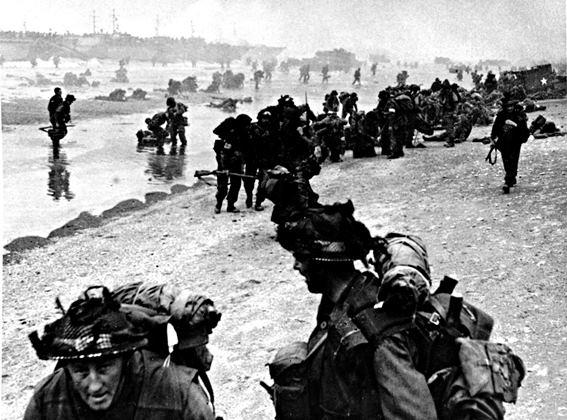
British soldiers on a Normandy beach on D-Day, 1944
National Records of Scotland, NSC1/394/26
Of the hundreds of British troops who died on D-Day itself, some 34 wills of Scottish soldiers reveal how the spearhead of the invasion consisted of assault infantry, commandos, specialist sappers, tank crews, glider troops, paratroopers, signallers and gunners.
Private Ian Ridland, Royal Scots & No. 4 Commando
One of the elite commandos was Private Ian Ridland, the son of an Edinburgh dentist, who had transferred from the Royal Scots regiment after passing the rigorous commando training course. He joined No. 4 Commando, and was killed on D-Day when his unit landed on Sword Beach, the most easterly of the Allied landing beaches.
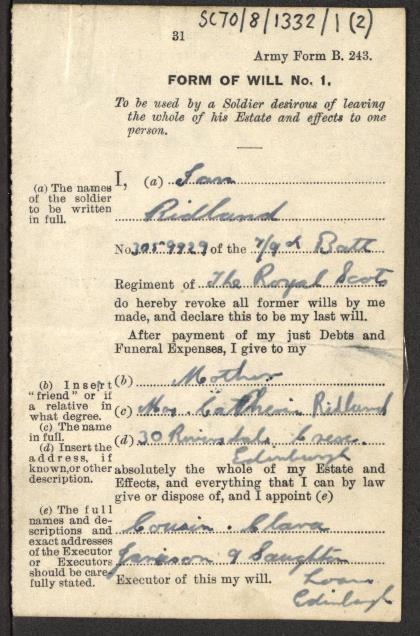
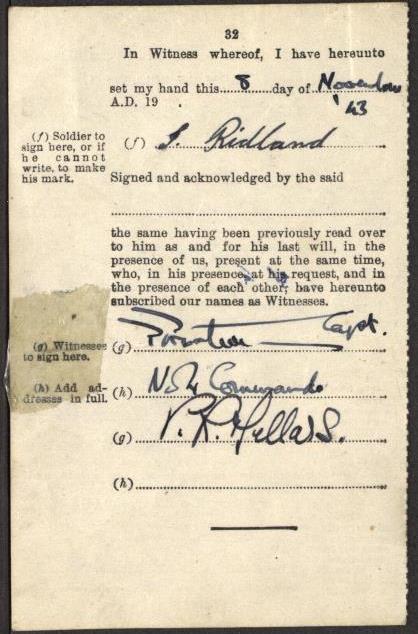
Ian Ridland's will, 8 November 1943
Crown copyright, National Records of Scotland, soldiers' wills, SC70/8/1332/1/3
Ridland had written his will months earlier, in November 1943, probably in anticipation of a commando operation. It is especially interesting because of the signature of the first witness, Captain Patrick Anthony Porteous, one of the most celebrated commandos of the war. He earned the Victoria Cross for his bravery during the disastrous Dieppe raid in August 1942, and on D-Day he led D Troop of No. 4 Commando. Porteous survived the war, as so perhaps did the second witness, Ridland’s comrade, P R Millard. Like most unmarried soldiers Ridland bequeathed all his estate to his mother.
Other commandos and airborne troops
Another heroic Scot in No. 4 Commando was Corporal (or Lance Sergeant) George Fraser from Beauly, which lay in the recruiting ground for Fraser’s original unit, the famous Lovat Scouts. Having landed at Sword Beach, the Commandos formed part of the defence of the bridgehead east of the River Orne. On 10 June Fraser led his section in a bayonet counter-attack on enemy troops, but was killed just as it succeeded. He was awarded a posthumous Military Medal. You can see photographs of Porteous and Fraser, and read more about their exploits and those of other commandos, on the Commando Veterans website.
Wills can be found of 4 other commandos who died between 6 and 10 June: Privates Edward Connor and George Croal (No. 6 Commando), Guardsman Alexander McDonald (No. 3 Commando) and Rifleman George McKinlay Craig (No. 4 Commando).
Airborne troops secured the left flank of the Allied invasion, at a heavy cost. Almost half of the D-Day wills are of men who fought with 6th Airborne Division, and of these 16 men, 11 were paratroopers in the Parachute Regiment, and two served in reconnaissance and signal units. The remaining three were sappers from 591 (Antrim) Parachute Squadron, Royal Engineers, who were to parachute in and remove anti-glider poles from landing grounds. Corporals Thomas Andrew Fraser and William Alexander Kelly, and Driver George Thomson were among 8 airborne soldiers who were captured at Grangues early on D-Day and executed by the Germans. You can read more about their extraordinary and tragic story on the Squadron’s website.
David Chalmers, 297 General Transport Company, Royal Army Service Corps
Many D-Day troops were going into action for the first time, and in spring 1944 wrote wills at their bases, in billets or at home. One man on home leave was David Chalmers, son of David Chalmers, a Dundee jute millworker, and his wife Mary. He left everything to his mother in the will he wrote on 11 April 1944, witnessed by a neighbour and another person. Chalmers described himself as a driver in the Royal Army Service Corps, but the Commonwealth War Graves Commission’s website reveals that he served in 297 General Transport Company, which operated DUKW amphibious vehicles for ferrying supplies onto the beaches. He died of his wounds on 8 June, aged just 19.
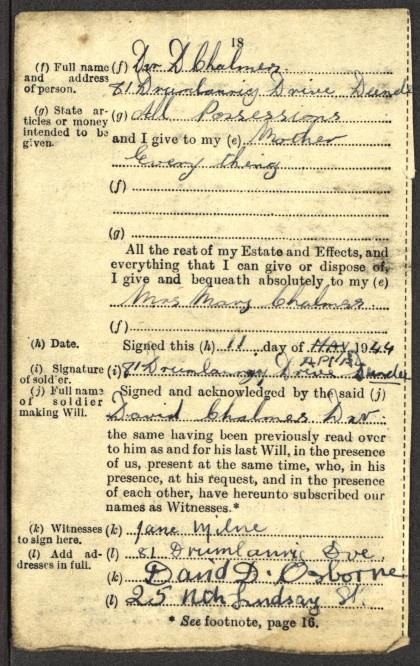
Will of David Chalmers, 11 April 1944
Crown copyright, National Records of Scotland, soldiers' wills, SC70/8/1332/158/3
Captain George McLennan, 77th Assault Squadron, Royal Engineers
Of the many British soldiers landing on D-Day, perhaps few showed the courage of Captain George McLennan, a young engineer from a Scottish military family, whose heroic conduct won him a posthumous Military Cross for ‘outstanding bravery and devotion to duty’. Leading three specialist Churchill tanks of 77th Assault Squadron which were armed with Petard mortars that were designed to overcome the defences on Sword Beach, he was killed while gallantly attacking German defenders who were pinning down British commandos, knowing that he stood little chance against enemy anti-tank guns at close range. McLennan left everything to his mother back home in East Lothian. She had to endure the absence of her husband Kenneth, a decorated veteran of the First World War who commanded various brigades overseas, the loss in December 1941 of her elder son Captain Kenneth McLennan, who died on active service in the Far East, and finally the death of her younger son on D-Day.
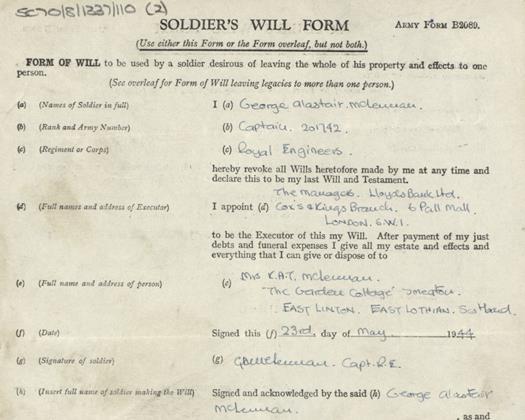
Will of Captain George McLennan, 23 May 1944
Crown copyright, National Records of Scotland, soldiers' wills, SC70/8/1332/110/2
When announcing the online release of the Soldiers’ Wills on 27 May 2014, Fiona Hyslop, Cabinet Secretary for Culture and External Affairs in the Scottish Government said: “These small but powerful documents are a testament to the sacrifice in wartime made by thousands of Scots, not only the soldiers themselves, but also their families and loved ones.”
For more information about searching Soldiers’ Wills and other wills and testaments, please see our guides.